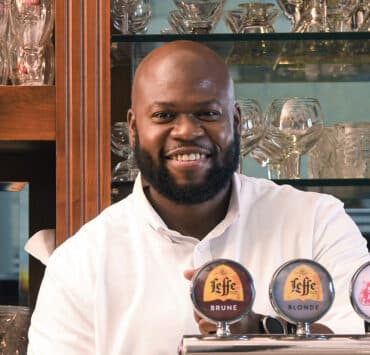|
Getting your Trinity Audio player ready...
|
In early 2020, TGI Fridays was prepared for a comeback. The well-known restaurant chain had overcome financial struggles, hired a new CEO, and restructured its management team. With the remade organization ready to change owners and go public, its marketing team launched an ad campaign that encouraged people to unite inside its fast-casual dining locations. Then, in March, COVID-19 put an end to social gatherings and forced restaurants and businesses to close their doors.
The pandemic threatened most businesses and industries in the United States, but it was particularly challenging for a company on the brink of a turnaround. TGI Fridays and Allegro Merger Group canceled their announced merger along with plans to take the company public. While the news would have devastated some companies, TGI Fridays leaders huddled together and formed a plan: they would survive the pandemic by adapting their business model to take advantage of new opportunities created by increasing demand and shifting consumer behavior.
Over the past two years, Associate General Counsel Leanne Stendell has created the legal framework for the new deals and partnerships that will help TGI Fridays compete on the new playing field created by COVID-19. Stendell, who knows Fridays well, is the right person for the job. As the organization’s first in-house trademark attorney, she built the practice from the ground up, putting in place all the necessary systems and procedures, including document management and docketing. Additionally, she selected all the foreign counsel partners in the approximately sixty countries where Fridays is active as well as the dozens of other countries in which Fridays maintains trademark filings.
“Anybody can succeed in an atmosphere where the budget is almost unlimited, but you have to live through these trials by fire to become an expert in doing more with less.”
Leanne Stendell
The pandemic hit Fridays hard. The organization immediately closed its corporate headquarters to all but essential staff in March 2020. At the height of the pandemic, only a handful of its 380 domestic locations were operational. “When your customers are literally prohibited from patronizing your business, tough times are inevitable,” Stendell says. “There were widespread furloughs, and during the early days in the spring of 2020, our budgets took a big hit.”
With Fridays seeing e-commerce transactions quadruple, it quickly became clear that off-premises sales were the key to survival during the lockdown. In response, Fridays identified and implemented three new technology platforms. Legal negotiated the contracts and partnerships to take these ideas from concept to reality in record time. They started curbside pickup within three days, launched to-go alcohol sales in jurisdictions that began permitting them, and converted parking lots to outdoor dining rooms.
Stendell and her colleagues had to move quickly. They first developed a set of decision-making standards to guide a time of unprecedented challenges. “Our first priority was making sure employees and guests were safe,” Stendell explains, adding that TGI Fridays monitored evolving federal, state, and local guidelines and implemented cleaning and safety protocols.
To help existing restaurants maximize sales, Fridays’ business team created virtual restaurant brands offered only via delivery partners like DoorDash, Uber Eats, and Grubhub. “It was an amazing way to put underutilized capacity to work while in-restaurant dining was still not possible, and it saved an untold number of jobs,” Stendell explains.
Legal had to clear and protect concept and product names, form the new business entities, and secure all state registrations and permits while renegotiating partnerships with delivery service providers. It took quick legal footwork to make these changes happen, but once they were in place, TGI Fridays was back in a favorable position.
In this fast-moving environment, Stendell admits she sometimes had to look past “best practices” and embrace “good-enough practices.” That can be a tough pill to swallow for a professional and a perfectionist, but Stendell thinks the exercise ultimately made her a stronger lawyer. “Anybody can succeed in an atmosphere where the budget is almost unlimited, but you have to live through these trials by fire to become an expert in doing more with less,” she says.
The measures Stendell and the legal team implemented helped the company keep most of its restaurants in business. Before the pandemic, takeout and delivery orders accounted for a fraction of total revenue. Now, that number has increased by more than four times. As countries around the world reopen, Fridays is deploying single-use menus, contactless payments through its app, and other strategies to enhance customer and employee safety.
Stendell studied journalism, went to business school, and earned an MBA before transitioning to law. While at Haynes and Boone, she helped build an international trademark clearance process to serve high-volume clients at home and abroad. That experience, together with the skills she developed at other in-house roles, has helped as Fridays expands into new brands and virtual brands in the US and around the world.
In late 2021, the company announced plans to join Reef’s platform and open three hundred “ghost kitchens,” the trendy pop-up commercial kitchens that prepare and send delivery orders directly to customers. TGI Fridays is the first global dining brand to partner with Reef.
The perseverance, leadership, and innovation demonstrated by their teams throughout this period have TGI Fridays’ executive team feeling optimistic. “People are returning. We’re known for great food and a welcoming atmosphere, and we think people are going to discover or rediscover their love for the brand,” Stendell says. TGI Fridays is ready for a second bite at a comeback.

